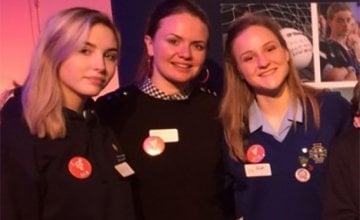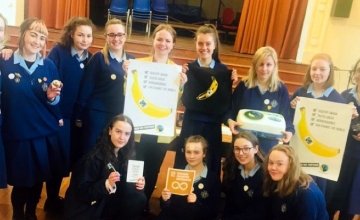
Read our 2024 annual report

Knowledge Hub
'Being a teacher gives me hope that another world is possible'

To celebrate World Teachers’ Day, Irish teacher Sorcha Mellon explains why it is important to engage young people on world issues and social justice.
An inspiring moment
After several long, hard weeks volunteering as a teacher in Kolkata, India, I had my first breakthrough teaching moment. It was the kind of moment that would be represented by a pinging lightbulb in a cartoon, or with the outburst of a catchy singalong in a musical.
I had spent weeks in the boiling heat questioning my teaching ability, as my students became increasingly confused by these new English words I was trying to teach them. Then, on a stormy day, when I was especially downtrodden by my seeming inability to teach these children, a student named Priya turned to me at the first sound of thunder and said: “Aunty, the sky is angry.” Suddenly, all of our work on the weather and feelings and everything I had been trying to teach fell into place with this one, simple phrase.
I went on to teach in Cambodia, Portugal, Brazil, Zambia and, of course, Ireland, but I think it was with that breakthrough moment that I truly discovered my love of teaching. I discovered the buzz of working closely with young people and helping them explore the joy of learning. It was in that moment that I first experienced the power of education to create human connections, regardless of age, race, religion or gender.
Fast forward eight years – and countless breakthrough teaching moments – and I still find being a teacher incredibly rewarding and enjoyable.
Sharing experiences
The late Maya Angelou once said: “If you get, give. If you learn, teach.” After my experiences working and travelling in the Global South, I knew that I wanted to share these life-changing experiences with my students in Ireland.
I had learned so many things that changed the way I saw and interacted with the world. I was keen to challenge my students to step outside their comfort zone, to empathise and to critically engage with the biggest challenges we face in today’s world.
I started off by signing up to the Concern Debates and Worldwise Global Schools and began to engage my students with social justice during English and Irish classes. I kept digging deeper to encourage my students to think more about society, equality and injustice. From this, our 'Global Issues Group' in Maryfield College was born.
Engaging youth
Throught the Global Issues Group, I began working closely with a smaller group of students who were committed to social change. We organised our first ever Intercultural day to celebrate our diversity as a school community and ran campaigns in the school for International Women’s Day. We also welcomed Minister Richard Bruton to our school for GEMinar – a seminar on gender equality organised by students.
We ran school awareness-raising campaigns on hidden conflict and we worked together to successfully get Fair Trade School Status. Over time our students went from anxious about giving opinions in class to winning Best New School in the Concern Debates. I was thrilled to win Best Team mentor the following year. Our long afternoons and late nights in the school library researching topics truly paid off.
We are so delighted and so proud to say that Maryfield College is a school where social justice education is very much alive and kicking.
Engaging young people with social justice issues is empowering for the teacher and the learner and brings a real sense of energy to the classroom and to the school environment. Initiatives like Young Social Innovators, Green Schools, Concern Debates and Worldwise Global Schools encourage us teachers to hand over the torch to our students. Let them think, let them negotiate, let them delegate, let them speak, let them listen, let them reflect.
The most rewarding element of teaching young people on these topics is watching the transformation.

Learning from real life
None of us know what the world will look like twenty years from now. Students are leaving school to enter a world that is constantly in flux. If we stand any chance of changing the world, we need to be creating critical thinkers, problem-solvers and responsible global citizens.
I try to make my classroom a place where learning comes from real-life experiences, whether that's a discussion arising from a comment overheard on the bus, an article on the news, a recent film or a some serious world problem. The students lead the discussion and the students’ voices are heard and valued.
No longer does the student wait for the teacher to pass on the knowledge and accept it without question. Surely, today more than ever, we must appreciate the need for students to critically engage with current affairs and the changing world all around them. In a world of fake news, Brexit, families in emergency accommodation and students doing homework in direct provision, being a teacher gives me hope.
Being a teacher gives me hope that another world is possible and that we need to provide more space for social justice education in our schools. We need to take more time to listen to our students and we need to give them more opportunities to collaborate and create innovative solutions that have the potential to shape the future.
Being a teacher reminds me, day after day, that all human beings are born free and equal in dignity and that it is our responsibility to ensure that every child in our schools learns to appreciate the power of their own voice and the importance of their own worth.
Being a teacher reaffirms for me that the future - in the hands of our young people - is bright.


